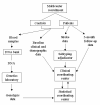The Ischemic Stroke Genetics Study (ISGS) Protocol
- PMID: 12848902
- PMCID: PMC184375
- DOI: 10.1186/1471-2377-3-4
The Ischemic Stroke Genetics Study (ISGS) Protocol
Abstract
Background: The molecular basis for the genetic risk of ischemic stroke is likely to be multigenic and influenced by environmental factors. Several small case-control studies have suggested associations between ischemic stroke and polymorphisms of genes that code for coagulation cascade proteins and platelet receptors. Our aim is to investigate potential associations between hemostatic gene polymorphisms and ischemic stroke, with particular emphasis on detailed characterization of the phenotype.
Methods/design: The Ischemic Stroke Genetic Study is a prospective, multicenter genetic association study in adults with recent first-ever ischemic stroke confirmed with computed tomography or magnetic resonance imaging. Patients are evaluated at academic medical centers in the United States and compared with sex- and age-matched controls. Stroke subtypes are determined by central blinded adjudication using standardized, validated mechanistic and syndromic classification systems. The panel of genes to be tested for polymorphisms includes beta-fibrinogen and platelet glycoprotein Ia, Iba, and IIb/IIIa. Immortalized cell lines are created to allow for time- and cost-efficient testing of additional candidate genes in the future.
Discussion: The study is designed to minimize survival bias and to allow for exploring associations between specific polymorphisms and individual subtypes of ischemic stroke. The data set will also permit the study of genetic determinants of stroke outcome. Having cell lines will permit testing of future candidate risk factor genes.
Figures
References
-
- Executive Committee for the Asymptomatic Carotid Atherosclerosis Study Endarterectomy for asymptomatic carotid artery stenosis. JAMA. 1995;273:1421–1428. - PubMed
-
- del Zoppo GJ, Higashida RT, Furlan AJ, Pessin MS, Rowley HA, Gent M. PROACT: A phase II randomized trial of recombinant pro-urokinase by direct arterial delivery in acute middle cerebral artery stroke. PROACT Investigators. Prolyse in Acute Cerebral Thromboembolism. Stroke. 1998;29:4–11. - PubMed
-
- Furlan A, Higashida R, Wechsler L, Gent M, Rowley H, Kase C, Pessin M, Ahya A, Callahan F, Clark WM, et al. Intra-arterial prourokinase for acute ischemic stroke. The PROACT II study: a randomized controlled trial. Prolyse in Acute Cerebral Thromboembolism. JAMA. 1999;282:2003–2011. doi: 10.1001/jama.282.21.2003. - DOI - PubMed
-
- Lewandowski CA, Frankel M, Tomsick TA, Broderick J, Frey J, Clark W, Starkman S, Grotta J, Spilker J, Khoury J, et al. Combined intravenous and intra-arterial r-TPA versus intra-arterial therapy of acute ischemic stroke: Emergency Management of Stroke (EMS) Bridging Trial. Stroke. 1999;30:2598–2605. - PubMed
Publication types
MeSH terms
Substances
Grants and funding
LinkOut - more resources
Full Text Sources
Medical
Molecular Biology Databases
Research Materials


